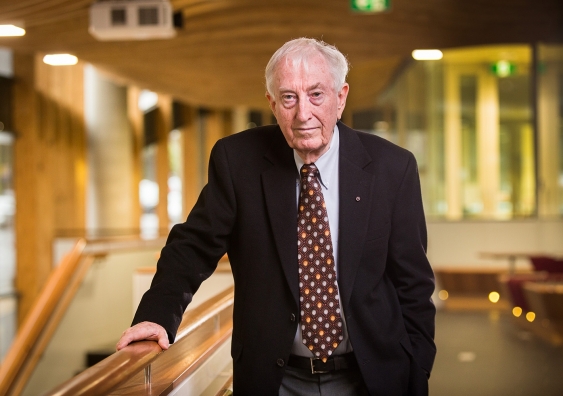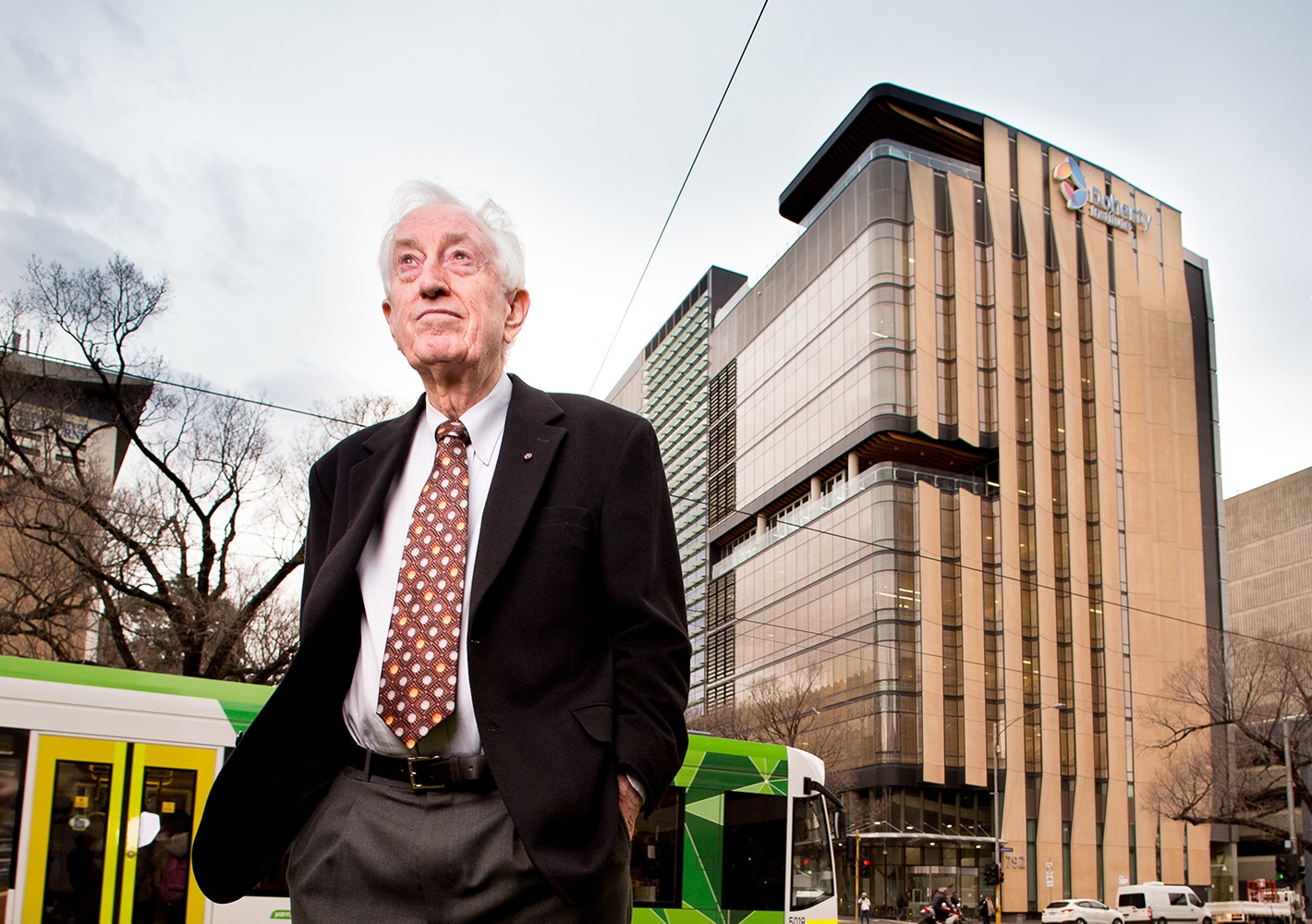Welcome to the “new normal”

The one thing Laureate Professor Peter Doherty, patron of the Doherty Institute, is looking forward to as society adjusts to a ‘new normal’, is a COVID-19 booster shot.
“I’m 81 years old and I’ve had two shots of vaccine. I’m looking forward to my booster shot because like a lot of people, I think I have become terrified of other human beings. We avoid them. I’m looking forward to losing that attitude with the assurance that I have good protection.
“I know my antibody levels because I’ve been a part of two observational trials and my colleagues have actually told me how well I’ve responded. So, vaccination is certainly big on my horizon and if it’s not on yours, make it!”
As we approach the two-year mark since the world first started to witness the beginning of what was to emerge as the COVID-19 pandemic, a panel of world-class experts at the latest UNSW Medicine & Heath MedConnect event were asked what they were most looking forward to with COVID-19 restrictions easing in Australia.
Daniel Hunter, Chief Executive Officer of Business NSW, said he was looking forward to the spring back of people and businesses as they come out of the pandemic. “We had the necessary lockdowns in New South Wales and they were necessary to protect the public health of the community as well as the hospital system. What got lost was the impact on people and people’s mental health. I’m looking forward to people being able to recover from that period.”
Deputy National Rural Health Commissioner Associate Professor Faye McMillan said she was looking forward to the extension of the generosity and kindness that has been seen from people and organisations towards each other. “I would like to see that continue as we move forward and create a new COVID-19 normal of what that looks like. For me, I think that’s what I’m most excited about.”
The panel discussion, led by Associate Professor Adrienne Torda, Associate Dean of Education and Innovation at UNSW Medicine & Health, included conversations about what we have learnt from the pandemic and what we can use moving forward. How can we apply our learnings to other problems we have in life and in the community? Who do we trust in terms of messaging during times of crisis? Politicians? Scientists? As a silver lining, has the pandemic sparked interest in young people pursuing a career in science and medicine after witnessing the likes of Dr Kerry Chant step up to the plate?
Don’t make the same mistakes again
Mr Hunter raised the importance of diversity and expertise in terms of who to trust during a crisis. “I don’t think you ever want to put too much trust in the medical profession or any profession. We saw for example the advice that was given about a perfectly good vaccine, AstraZeneca. We saw a small group without a diverse enough opinion saying that only people over 60-years-old should have that vaccine when really the risks were low and we could have rolled it out.”
“I will get hate mail for this, which I’m used to, but we could have rolled it out more broadly and could have got a more vaccinated population much quicker. But because we did not have enough diversity, we did not get the right outcome. We should have had a group that had the medical profession well represented.
“We should have had mental health experts on that panel assessing what the mental health impact would be as a result of a delayed vaccine rollout. What effect will lockdowns have on people? We should have economists on that panel as well, looking at the economic impacts. There should have been people from vulnerable communities on that panel. What I would say is to trust the diversity of opinion and make sure we get voices at the table – sensible voices – to make collective decisions so we don’t make those mistakes again.”
Access to vaccines and healthcare
When asked about what inroads we were making to vaccinate our most vulnerable, Prof. McMillan said we need to consider aged care, people living with disabilities, Indigenous communities and how to access these groups.
“The conversation is talking about access to things that obviously are costing and can potentially exponentially double. What about those people who don’t have access to hospitals, even to get the drug or the IV set up?
“It is the inequities being experienced around how vaccines are being delivered and what we do know is that it’s a bit like the Telstra slogan that we are covering 98% of Australia but it is not always the optics of how it’s being experienced in communities. So, when we say we have 80% immunised, that’s not always the case, and we do have communities that don’t have that vaccination rate. They don’t have access to the vaccines the same way that hubs do, and we’ve got to get vaccines to more people.”
Prof. McMillan referred to the Wilcannia community as an example, where a COVID-19 outbreak resulted in a swift response in getting vaccines to people, as opposed to bringing people into larger cities to be vaccinated.
“I haven’t heard much about people not wanting to be vaccinated. It’s ‘I don’t want to get COVID, so I don’t want to go to those larger areas or regional cities where we know COVID exists’. For some of the smaller rural communities, they know the virus is not circulating in their communities at this point, but the minute they go out, they could potentially be exposed to an environment where they could bring it back to their families. So that’s not vaccine hesitancy, that’s COVID hesitancy and that’s something most people are fearful of if they’re not vaccinated.”

“The concern is – and we will likely see this happen in the northern hemisphere first – if a variant emerges that jumps the immune barrier,” said Laureate Professor Peter Doherty.
Opening up to the rest of the world
In response to a question about whether we have enough processes in place to prevent widespread outbreaks in Australia once our borders reopen to the rest of the world, Prof. Doherty said he didn’t see a problem with this if the virus circulating in other countries were the same as the virus circulating in Australia. This was in addition to having a high rate of the Australian population vaccinated.
“The concern is – and we will likely see this happen in the northern hemisphere first – if a variant emerges that jumps the immune barrier. Then we would have to reinstitute some quarantine-type protocol to try and keep that variant out until we had a vaccine. But, at the moment, if it is the same virus, so what?”
While the Therapeutic Goods Administration (TGA) considers Sinovac as a ‘recognised vaccine’, Prof. Doherty suggested overseas visitors fully vaccinated with Sinovac, should be offered a Pfizer booster shot on arrival. He said while Sinovac is not nearly as effective as the vaccines approved in Australia such as Pfizer or AstraZeneca, “it will boost up quite nicely”.
A/Prof Torda ended the lively panel discussion with the following honest and thoughtful words: “Even though we are a little fearful at the moment, give us some time and we will adapt, and we will find our new normal.”
Emi Berry is a digital content manager with more than a decade of experience in managing social media and website content for a range of organisations.















